Best Cities for Working Women + Fishbowl’s Industry Insights

March is Women's History Month! In observing the powerful impact of women's past, present, and future, we put together a report with Apartment List’s Women’s Employee Resources Group (“Women@ ERG”) and Fishbowl, a social network for professionals to uncover the best cities for working women.
We polled our Women@ ERG to understand what factors are important to them. They believe that income equity, employment opportunities, and being surrounded by a fulfilling and diverse community are most essential when choosing a new place to live.
Therefore, our ranking takes into account recent data that reflect economic equity, business representation, affordability, and community satisfaction for women. We find the best cities for working women are:
- Raleigh, NC
- Atlanta, GA
- Austin, TX
- Washington, DC
- Minneapolis, MN
- Richmond, VA
- Denver, CO
- Columbia, SC
- Albuquerque, NM
- San Francisco, CA

Why This Matters
Women’s History Month sparks necessary conversations on equal pay and gender equality in the workplace. So to properly honor this month, we must first acknowledge the inequities in the workplace that persist between male and female workers. Women only earn 72 cents for every dollar men make. On top of this, women are promoted to manager at far lower rates than men. These stats underscore the difficulties of being a woman in the workplace.
This is why we’ve partnered with Fishbowl to shed light on the story the numbers can’t tell–what it’s like being a woman in the workplace.
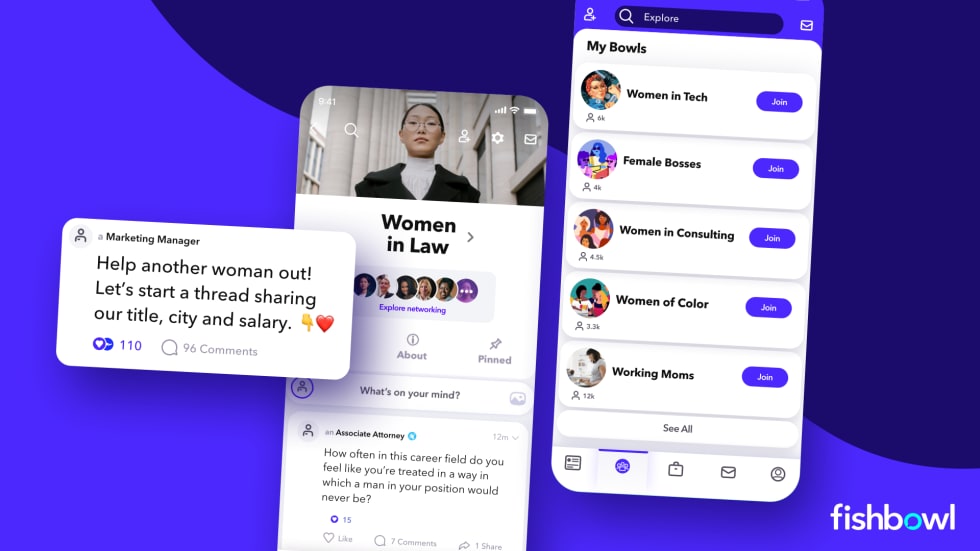
Women on Fishbowl voiced their opinions on representation in the workplace. When asked, “Are women well represented in your company?” 63% of fishbowl female user respondents said they felt well-represented.1

Despite the somewhat favorable response, over one-third (37%) of respondents answered “no”. In a series of threads on Fishbowl discussing female representation across professions in U.S. cities, females widely cite male-dominated industries and occupations for the ongoing under-representation of women. Their comments reveal the harmful stereotypes as well as the unfavorable work conditions for women working in these male-oriented fields.
- “Over 95% of [the] time I am the only woman in any deal meeting.” (PwC M&A Manager)
- “No. As a matter of fact our CEO and VP are men and did posts on LinkedIn for International Women's Day because we have no women in leadership. Talk about tone deaf” (Service Channel employee)
Perhaps the most significant factor contributing to the imbalance of professional female representation across industries in their city, according to women on Fishbowl, is the lack of representation of Women of Color (WOC), or women who identify as Asian, Black, Native American, or Latino/Hispanics.
- “White women, yes. Black and Latina women? Nope. I’m in Boston.” (Senior Copywriter)
- “Yes for the most part. To dig a bit deeper than just “women” I would challenge that and add that women of color are NOT well-represented.” (Healthcare worker)
Ranking Methodology
To identify the top 10 U.S. cities for working women, we looked at criteria to help determine a score across four categories: Economic Opportunity, Communication Satisfaction, Business Representation, and Housing & Affordability. The full methodology incorporates sentiment from our Women@A-List colleagues and insights previously mentioned above from Fishbowl.
- The Economic Opportunity score identifies places where women succeed in the workplace. This score considers the female employment rate, female college graduation rate, median female earnings, and the earnings gap between women and men.

- The Community Satisfaction score identifies places where women (and their families) thrive within their broader community. This score considers violent crime rates, primary and secondary school enrollment rates, racial and ethnic diversity, and female satisfaction with social and dating opportunities.

- The Business Representation score identifies places where women are properly represented in key societal functions. This score considers the share of local businesses that are owned by women, the share of local physicians who are women, and the share of public administration jobs (e.g., local government) that are held by women.

- The Housing & Affordability score identifies places where women are least burdened by increasing cost-of-living expenses. This score considers the homeownership rate among women who live alone, the median rent for a 1-bedroom apartment, and the share of women who say they are satisfied with local affordability.

These four scores, and the individual statistics that comprise them, are equally-weighted and added together to arrive at a final composite score between 0-100 for each city. Higher scores indicate places that offer better economic outcomes for women, greater levels of gender equality, and higher community satisfaction.
Although we considered racial and ethnic diversity in our scoring, we acknowledge that this ranking does not account for all forms of diversity, including ability, sexuality, or religion. Nor does it capture all of the factors that may encourage or discourage gender equality at a local level. For a more detailed look at the numbers behind the rankings, see the data section below.
Key Findings
We analyzed data for over 80 cities to determine the Best Cities for Working Women. Below are key findings and highlights for each of the cities that made it into the Top 10.
- Raleigh, North Carolina is the overall best city for working women, having received high scores in all categories while still maintaining relative affordability compared to other large cities across the country.
- Cities with a historically women’s college presence score high. Five of the top 10 cities have historically women's colleges.
- Capital cities in particular offer good opportunities for working women. Seven of the cities in the top 10 are capitals: Raleigh, Atlanta, Austin, Washington DC, Richmond, Denver, and Columbia.
- Cities that have a high business score are great for female professionals. Nine out of the cities in the top 10 ranked in the top quartile for their business scores.
- Raleigh and Atlanta are the best places for Black female professionals. They both scored in the top 10 for our Best Cities for Black Professionals and this report!
- Austin and Washington DC are truly great places to live. Both cities scored in the top 10 for this report along with the Best Cities for Black Professionals and Best Cities for Dating reports.
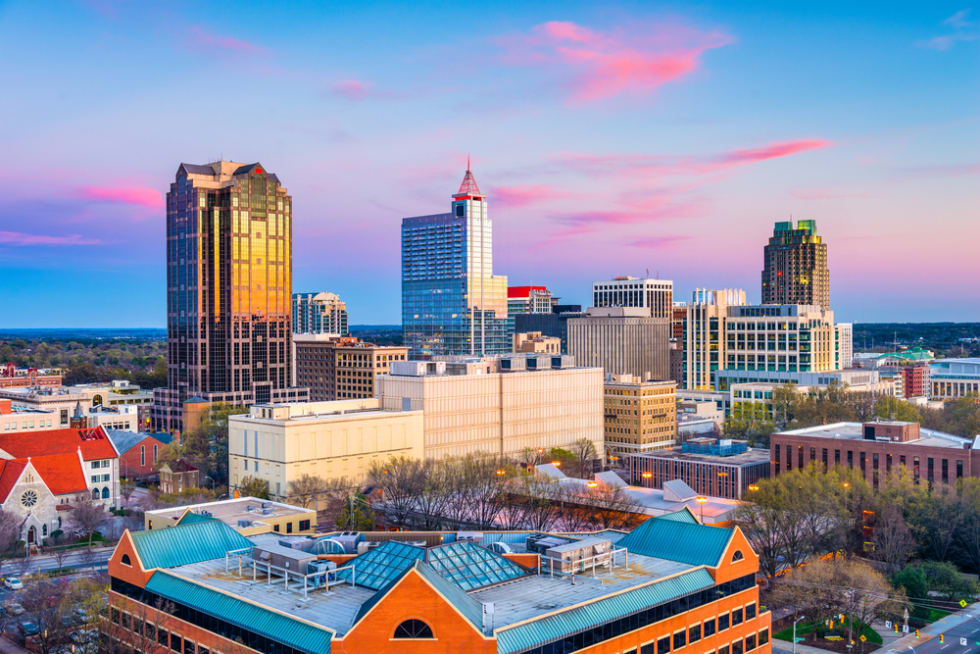
1. Raleigh, NC
Coming in first place is Raleigh, NC! With a final score of 69.83, Raleigh is the best city for working women. Unsurprisingly, Raleigh has also ranked #6 for best cities for Black professionals. It ranks well on all scores, including a #7 position for economic opportunity, #5 for community satisfaction, and #5 for business representation. Raleigh’s lowest ranking is for its housing and affordability, which ranks #52.
Raleigh is home to one Historically Women's Colleges and Universities, Meredith College. On top of this, Raleigh is a part of the Research Triangle which is home to the University of North Carolina, Duke University, and North Carolina State University. The Triangle fosters a high concentration of tech jobs, so it’s no surprise that nearly half of the region’s female population has a college degree.
Combined with a strong job market, the median income among Raleigh’s female population is on the higher end of the range compared to the rest of the country. Yet inequalities persist, and female incomes in Raleigh remain nearly 26% lower than those of their male counterparts. This is echoed by the fact that 61% of Fishbowl female users responded that women are well-represented at their company, below the national average of 63%.
45% of businesses in Raleigh are woman-owned. So you can grab some fresh flowers at Bowerbird Flowers & Apothecary, make a terrarium of your own at The Zen Succulent, or grab a bite to eat at Carroll’s Kitchen!
In addition, while the median income for women in Raleigh is on the higher end at $35,151, it still falls below the national average for women, contributing to the lower number of homeownership across the city.

2. Atlanta, GA
Atlanta sits in second place for the best cities for working women, with a final score of 67.18! Atlanta ranks well for most factors, such as #2 for its business representation and #3 for community satisfaction. However, Atlanta’s economic opportunity ranks at #27, and its lowest ranking is for housing and affordability at #52.
Atlanta is home to a historically Black women’s college, Spelman College. One of the factors that could’ve contributed to its ranking #2 for best cities for Black professionals. This lack of historically women’s colleges density may explain why Atlanta’s economic opportunity ranking is in the middle ground of the others on our list.
There were positive responses in Fishbowl’s poll as 65% of Atlanta female respondents felt women were well represented at their company.
Women-owned businesses are prevalent in Atlanta at 47%. Shop around The Village Market, showcasing over 25 different Black-owned brands, find a nice bottle at Perrine’s Wine Shop, or grab a treat for your furry friend at Big Daddy Biscuits.
Lastly, 53% of women who live alone in Atlanta are homeowners. Similar to Raleigh, this falls below the national average. Also, in line with this trend, the median income for women in Atlanta is $31,561, well below the national average for women, likely contributing to the lower homeownership for women across the city.
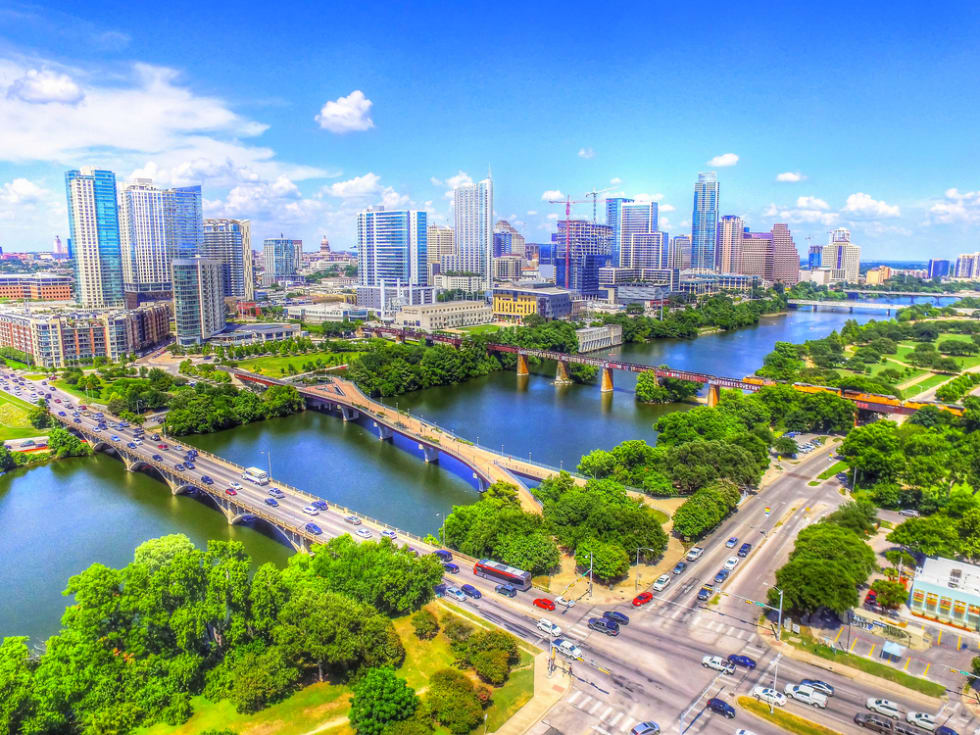
3. Austin, TX
Moving to the Lone Star State, only one Texas city ranks in our Top 10. Austin, with a final score of 63.67 and the #1 ranking in community satisfaction, ranks third. Additional Top 10 rankings for Austin include economic opportunity (#9) and business representation (#10). The only lower ranking for this city comes from its housing and affordability (#77).
Unsurprisingly, Austin has been ranked #5 in the best cities for dating, #7 for the best cities for singles, and #9 for best cities for Black professionals.
Women in Austin are also satisfied with female representation at their companies, which is demonstrated by a score of 72% of fishbowl respondents in agreement.
The share of female graduates is high at 45%. While Texas is a mecca of historically women’s colleges and universities, with 15 across the state, there’s none in Austin. However, Tillotson College was formerly a historically Black women’s college from 1926 to 1935. Now it remains an HBCU.
Despite this, there’s no lack of female-owned businesses to support in Austin. Start your day off with a full-body barre workout at Barre3. Then grab a made-to-order salad at Baby Greens. Lastly, spend the remainder of the day shopping at Miranda Bennett Studio.
The female homeownership rate is 45%, much lower than average. Even though the local female employment rate is relatively high (96%), the median income for women ($33,350) is below the national average, contributing to the low homeownership rate. Additionally, female incomes are nearly 28% lower than males in Austin, which sheds light on Austin’s gender wage gap.
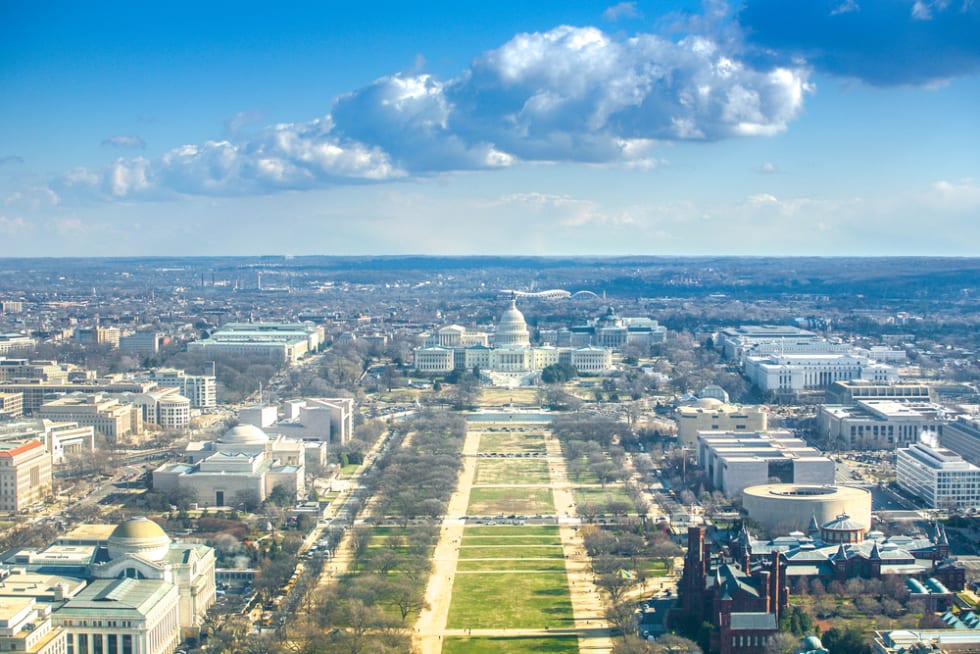
4. Washington, DC
Moving right along to our 4th-best city for working women is the nation's capital, Washington, DC. With a final score of 63.64, Washington, DC boasts a robust economic opportunity score (#2) and community satisfaction (#7). The business representation isn’t too shabby, ranking #16. But higher housing costs hurt Washington DC’s housing and affordability score, which ranks #78.
The female community in DC is well-represented in some critical occupations, with 43% of doctors being women in Washington, DC. This may explain the fishbowl respondents' satisfaction in their representation at their companies coming in at 68%. The community has also been ranked #1 in the country for best cities for singles, #7 for best cities for dating, and #1 for best cities for Black professionals.
Washington, DC is also home to the historically women’s college, Trinity Washington University. Not surprisingly, the median income for women in Washington, DC, is $44,023, which is at the top of our list of the major cities throughout the country. Still, women in Washington DC earn 25% less than men.
44% of local businesses are women-owned, which is about average on our list. So pick out the freshest blooms at Poppy, try the legendary brioche donuts at Mah-Ze-Dahr Bakery, or connect with other female-owned businesses at Steadfast Supply.
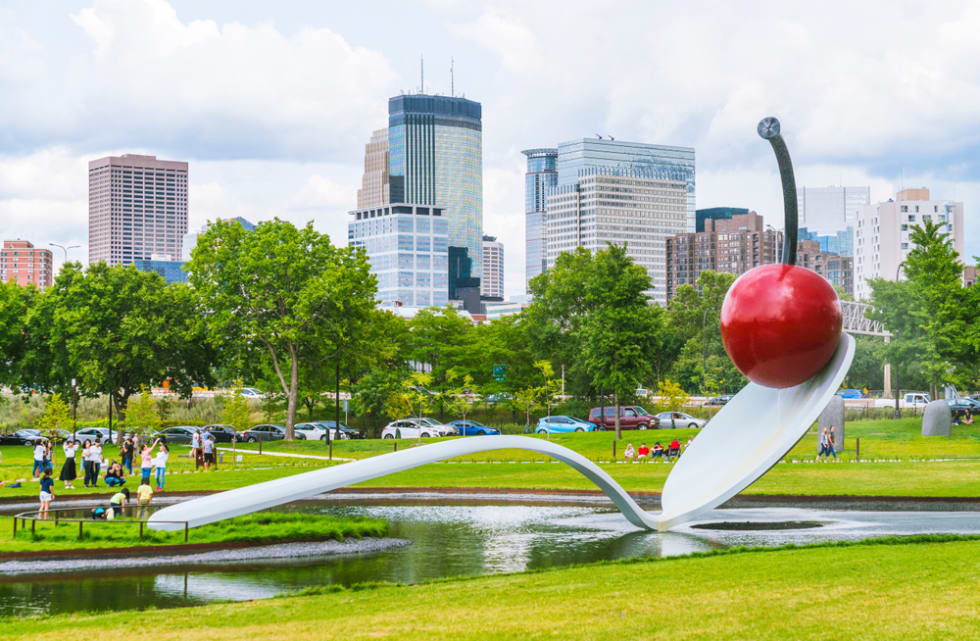
5. Minneapolis, MN
Rounding out our Top 5 is Minneapolis, MN. With a final score of 62.90, Minneapolis boasts a strong economic opportunity score (#5). The business representation score (#23) and community satisfaction score (#37) isn’t too shabby either, though the housing and affordability score falls middle ground at #46.
67% of Fishbowl female users believed women were well represented at their companies in Minneapolis. Outside of gender representation, Minneapolis has a relatively low racial and ethnic diversity index, currently at 38%, unlike others on our top list. Still, Minneapolis’s female-led community is relatively well-represented, with 42% of businesses being women-owned. Find some of the highest quality olive oils at Love That Oil, shop around at Leela & Lavender, or grab a bite to eat at Lemon Grass Thai.
Average female incomes in Minneapolis are comparable to those of Raleigh, Hartford, and Denver. Minneapolis has also been ranked #4 for the best cities for singles, making it an unbeatable community for this demographic. Keeping that in mind, Minneapolis has just one historically women’s college, Saint Catherine University.
The female homeownership rate is 54%, which is average and on par considering the median female income of $36,352, comparable to other major cities throughout the country.

6. Richmond, VA
Next up is Richmond, VA, with a final score of 62.69. Richmond ranks decently overall, including a #14 position for business representation, #16 for economic opportunity, and #19 for community satisfaction. Richmond’s lowest ranking is for its housing and affordability, which ranks #47.
Though Richmond is home to one historically women's college, Westhampton College, only 38% of the female population has a college degree in this region. It’s apparent that inequalities persist here, and female incomes in Richmond remain nearly 25% lower than those of their male counterparts.
44% of businesses in Richmond are woman-owned. Get a new ‘doo at Parlor Salon, hit a cycle sesh at Hour Cycle Studio, or get lost in a book at Fountain Bookstore. Thankfully, there’s no shortage of options for women-owned businesses in Richmond. Also important to note is that Richmond has been ranked #6 best cities for singles!
In Richmond, 55% of the female households own their homes, below the national average across the major cities. Since the median income for women in Richmond is on the lower end at $32,450, it might contribute to the lower number of homeownership across the city.

7. Denver, CO
Denver also makes our list with a final score of 61.69! The city ranks well for most factors, such as #6 for its economic opportunity and #15 for business representation and community satisfaction. Not surprisingly, the higher housing costs hurt Denver’s housing and affordability score, which ranks #75.
Despite its high ranking for economic opportunity, Denver ranks low for women representation at companies. Only 55% of female Fishbowl respondents felt represented at their workplaces.
Denver is home to one historically women’s college, Colorado Women’s College, which is a division of the University of Denver.
Today, the city is wildly popular across the board. Denver has been ranked #8 best cities for singles, amongst countless other best-of lists.
Women-owned businesses are pretty common in Denver at a 44% share. Pick up a beautiful bouquet at Bloom by Anuschka, stop by the bar-meets-bookstore BookBar, or shop around Denver Darling.
Lastly, 55% of the female population in Denver are homeowners. Similar to others on this list, this falls below the national average. In contrast, the median income for women in Denver is $35,987, which is above average compared to the other median incomes we examined. It likely contributes to the lower homeownership for women across the city.
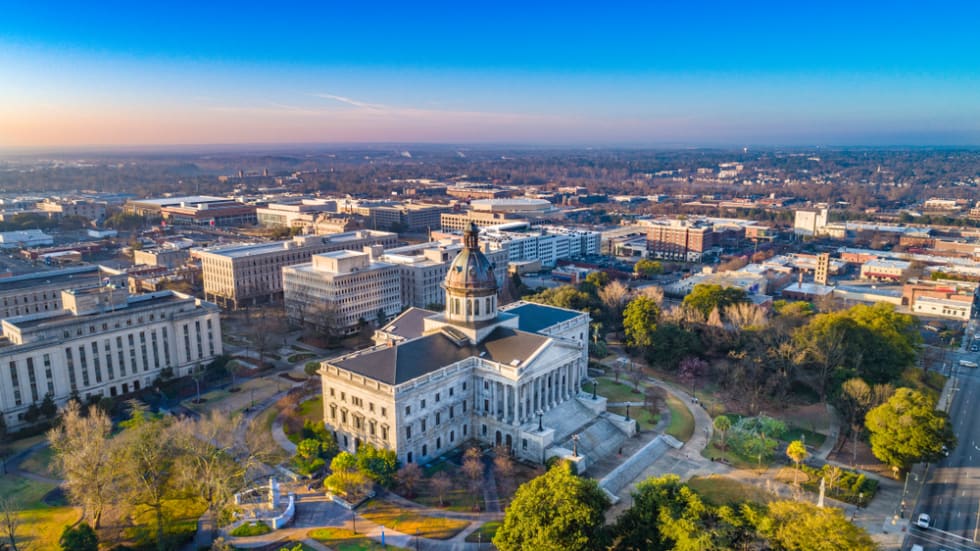
8. Columbia, SC
Next up is Columbia, SC, with a final score of 61.14, a #9 ranking in the business representation, and a #11 ranking in housing and affordability. Other mid-range scores include #54 for economic opportunity and #59 for community satisfaction.
The share of female graduates is low at 34%. South Carolina was once a mecca of historically women's colleges, but over the past decade, most of them have closed or become co-ed.
There’s no shortage of female-owned businesses in Columbia at 45%. Start your day with a mani/pedi at The Nail Barre. Then grab brunch with the girls at PalatePalate. Lastly, pick up handcrafted indie pieces at January Jewelry.
We’re happy to report that the female homeownership rate is 62%, amongst the highest numbers in the major cities throughout the country. However, even though the local female employment rate is relatively high (94.00%), the median income for women ($27,671) is well below the national average. Additionally, female incomes are nearly 25% lower than males in Columbia.

9. Albuquerque, NM
The 9th best city for working women is Albuquerque, NM. With a final score of 61.06, Albuquerque boasts a strong housing and affordability score (#7) and business representation score (#11). The economic opportunity score (#50) and community satisfaction score (#62) are also not too bad.
The female community is represented in critical occupations, as 48% of doctors in Albuquerque are women as are 43% of public administrators.
Unfortunately, the city has no historically women’s colleges and universities. This factor may contribute to the median income for Albuquerque women at $27,389, which is at the low end of our list. Female earnings are 22% lower than male earnings in Albuquerque.
Thankfully, 47% of local businesses are women-owned, which is on the higher end of our list. Learn how to dance at the National Institute of Flamenco, grab a bite to eat at Annapurna’s World Vegetarian Cafe, or get some R&R at Betty’s Bath & Day Spa.

10. San Francisco, CA
Rounding out our Top 10 is San Francisco, CA. With a final score of 61, San Francisco boasts the strongest economic opportunity score (#1). The business representation (#8) and community satisfaction (#10) aren’t too bad either. However, as the priciest housing market in the country, San Francisco’s housing and affordability score (#85) drops it to the bottom of our Top 10 list.
The San Francisco Bay Area has the nation’s highest diversity index. On top of this, 62% of women feel represented at their companies according to fishbowl respondents. Not surprisingly, the female-led community is relatively well-represented, with 44% of businesses being women-owned. Start your day off at Namaste Yoga & Wellness, then reward yourself with a tasty treat from Cupcakin’ Bake Shop. Lastly, grab an organic tea at Kaleidoscope Coffee.
Average female incomes in San Francisco are amongst the highest at $45,253, yet San Francisco doesn’t have any open women’s colleges, as they’ve merged with other universities.
The female homeownership rate is 46%, which is relatively low, considering the high median income for women in the city. The extraordinarily high cost of living in San Francisco could contribute to the lack of female representation in homeownership in the city.
Best Cities for Working Women Data
Use the table below to compare the cities and their respective scores. Below the Rankings table you will find more granular information about the data and how our scores were calculated.
Best Cities for Working Women Rankings
| Ranking | City | Final Score |
|---|---|---|
| 1 | Raleigh, NC | 69.83 |
| 2 | Atlanta, GA | 67.18 |
| 3 | Austin, TX | 63.67 |
| 4 | Washington, DC | 63.64 |
| 5 | Minneapolis, MN | 62.91 |
| 6 | Richmond, VA | 62.69 |
| 7 | Denver, CO | 61.69 |
| 8 | Columbia, SC | 61.14 |
| 9 | Albuquerque, NM | 61.06 |
| 10 | San Francisco, CA | 61 |
Best Cities for Working Women by Weighted Factor
| Ranking | City | Economic Opportunity | Community Satisfaction | Business Representation | Housing & Affordability |
|---|---|---|---|---|---|
| 1 | Raleigh, NC | 7 | 5 | 5 | 52 |
| 2 | Atlanta, GA | 27 | 3 | 2 | 56 |
| 3 | Austin, TX | 9 | 1 | 10 | 77 |
| 4 | Washington, DC | 2 | 7 | 16 | 78 |
| 5 | Minneapolis, MN | 5 | 37 | 23 | 46 |
| 6 | Richmond, VA | 16 | 19 | 14 | 47 |
| 7 | Denver, CO | 6 | 15 | 15 | 75 |
| 8 | Columbia, SC | 54 | 59 | 9 | 11 |
| 9 | Albuquerque, NM | 50 | 62 | 11 | 7 |
| 10 | San Francisco, CA | 1 | 10 | 8 | 85 |
A total of 86 locations were included in this analysis. For individual factors (e.g., employment rate, median income), weights, and data sources, please view the complete data. Each factor was converted into a normalized score from 0 to 100 according to the distribution of values across locations. Normalized scores were then weighted and summed to give every location a final composite score between 0 and 100. A score of 100 would mean a location ranked first in every individual factor in the analysis.
Fishbowl Collaboration
It can be hard to find and connect with other women in your industry. Professional networking app Fishbowl is here to help. Fishbowl providse a safe place for ambitious women in business to connect, share stories of success (or failure), and learn from each other. With communities for women in every industry, you’ll never be alone again. Get a better understanding of Fishbowl female users' workplace satisfaction and career opportunities in the pandemic era, by reading their Women at Work 2022 report! For more information on Fishbowl, visit www.fishbowlapp.com
Women@A-List Collaboration
We wrote this report in collaboration with the Apartment List Women ERG, also known as, "Women@A-List.”
Employee Resource Groups (ERGs) at Apartment List are meant to serve as a safe space for Apartment List employees. They meet frequently to chat about their shared experiences, plan company-wide events, and form allyship across the company. Apartment List has 5 different ERGs that each represent a different identity group: Women, Black, Asian, Latinx, and LGBTQ+.
- Fishbowl insights relevant to the top 10 cities are included in this report. Fishbowl provided Apartment List with the geographic breakdown of female responses to the survey question: “Yes or No, Are women well-represented at your company?” The survey ran March 1, 2022 through March 6, 2022 and was answered by 3,684 female professionals on Fishbowl. Respondents included employees at companies such as IBM, JP Morgan, Meta, McKinsey, Bank of America, Amazon, Edelman, Nike, Google, KPMG, and thousands of others. Fishbowl insights were not used to determine the city rankings.↩
Share this Article




